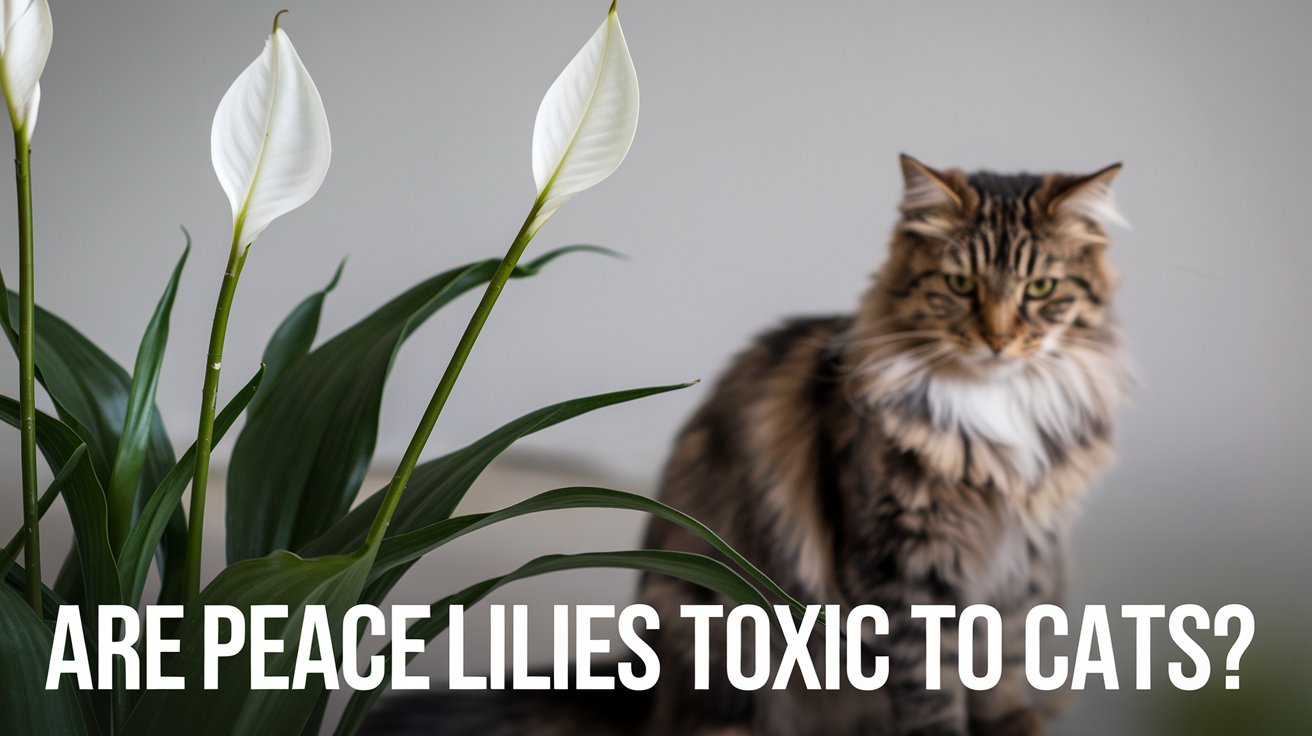
Are Peace Lilies Toxic to Cats?
Peace lilies, with their elegant white flowers and lush green leaves, are a popular choice for homes and offices. However, as pet owners, we must ask ourselves: Are peace lilies toxic to cats? The answer is yes, peace lilies are toxic to cats, and understanding the dangers and symptoms associated with this beautiful plant is crucial for keeping our feline friends safe.
Understanding the Toxicity of Peace Lilies
The peace lily (Spathiphyllum species) contains compounds known as calcium oxalate crystals. These tiny, needle-shaped crystals are found in all parts of the plant, including the leaves, stems, and flowers. When a cat chews or bites into any part of the peace lily, the calcium oxalate crystals are released, causing immediate irritation and pain.
How Calcium Oxalate Crystals Affect Cats
When a cat ingests or chews on a peace lily, the calcium oxalate crystals embed themselves in the tissues of the mouth, tongue, and throat. This leads to a variety of symptoms that can range from mild to severe. The primary symptoms of peace lily poisoning in cats include:
- Drooling: One of the first signs that a cat has ingested a peace lily is excessive drooling. This is the body’s response to the irritation caused by the crystals.
- Oral Pain: Cats may paw at their mouths, have difficulty swallowing, or refuse to eat due to the pain and discomfort caused by the crystals.
- Swelling: The mouth, tongue, and throat can become swollen, making it difficult for the cat to breathe or swallow.
- Vomiting: In some cases, ingestion of the plant can lead to vomiting as the body attempts to rid itself of the toxins.
- Difficulty Breathing: Severe cases of peace lily poisoning can cause swelling in the throat, leading to difficulty breathing and, in extreme cases, respiratory distress.

Immediate Actions to Take if Your Cat Ingests a Peace Lily
If you suspect that your cat has ingested or chewed on a peace lily, it is essential to act quickly. Here are the steps you should take:
- Remove the Plant: If your cat is still near the peace lily, remove the plant immediately to prevent further ingestion.
- Rinse the Mouth: Gently rinse your cat’s mouth with water to help remove any remaining plant material and reduce irritation. Be cautious not to cause further stress or discomfort.
- Monitor Symptoms: Keep a close eye on your cat for any signs of swelling, difficulty breathing, or other symptoms mentioned above.
- Contact Your Veterinarian: It is crucial to seek veterinary advice as soon as possible. Your veterinarian may recommend bringing your cat in for an examination or provide instructions for home care.
Veterinary Treatment for Peace Lily Poisoning
When you take your cat to the veterinarian, they will likely perform a thorough examination and assess the severity of the poisoning. The treatment may include the following:
- Flushing the Mouth and Throat: The veterinarian may flush your cat’s mouth and throat with water or a saline solution to remove any remaining crystals and reduce irritation.
- Medications: Pain relievers and anti-inflammatory medications may be administered to alleviate pain and swelling.
- Fluid Therapy: In cases where vomiting or dehydration occurs, fluid therapy may be necessary to ensure your cat stays hydrated.
- Oxygen Therapy: If your cat is experiencing difficulty breathing, oxygen therapy may be provided to help them breathe more easily.
Preventing Peace Lily Poisoning in Cats
The best way to protect our cats from peace lily poisoning is to prevent them from coming into contact with the plant in the first place. Here are some tips to help you keep your cat safe:
- Choose Cat-Safe Plants: Opt for non-toxic plants safe for cats, such as spider plants, Boston ferns, or catnip. Always research any plant before bringing it into your home to ensure it is safe for your pets.
- Keep Plants Out of Reach: If you must have peace lilies in your home, place them in areas that are inaccessible to your cat. Consider using hanging planters or placing the plant in a room that your cat does not have access to.
- Use Deterrents: Consider using pet-safe deterrent sprays on plants to discourage your cat from chewing on them. These sprays are usually odorless to humans but have a taste that cats dislike.
Are There Other Plants Similar to Peace Lilies That Are Toxic to Cats?
Peace lilies are not the only plants that pose a risk to our feline companions. Several other common houseplants are toxic to cats and should be avoided or kept out of reach. Some of these plants include:
- Lilies (Lilium and Hemerocallis species): True lilies, such as Easter lilies, tiger lilies, and daylilies, are extremely toxic to cats. Even small amounts of ingestion can lead to kidney failure and death.
- Philodendrons: These popular houseplants contain calcium oxalate crystals, similar to peace lilies, and can cause oral irritation, drooling, and vomiting.
- Aloe Vera: While aloe vera has many benefits for humans, it is toxic to cats and can cause vomiting, diarrhea, and lethargy if ingested.
- Dieffenbachia: Also known as dumb cane, this plant contains calcium oxalate crystals and can cause severe oral irritation, swelling, and difficulty breathing in cats.

Conclusion: Are Peace Lilies Toxic to Cats?
In conclusion, peace lilies are toxic to cats, and the potential for harm is significant. As responsible pet owners, we must ensure our homes are safe environments for our feline companions. By choosing cat-safe plants, keeping toxic plants out of reach, and being vigilant about our pets’ interactions with houseplants, we can help prevent accidental poisonings and keep our cats healthy and happy.
Frequently Asked Questions
What happens if a cat eats peace lily?
If a cat eats a peace lily, it may experience symptoms such as drooling, oral pain, swelling of the mouth and throat, vomiting, and difficulty breathing due to the toxic calcium oxalate crystals in the plant.
How to keep cats away from peace lily?
To keep cats away from peace lilies, place the plant in an area that is inaccessible to your cat, use hanging planters, or consider applying pet-safe deterrent sprays to make the plant less appealing to your cat.
Can I have lilies in the house with a cat?
It is not safe to have lilies in the house with a cat. Lilies, including peace lilies and true lilies, are highly toxic to cats and can cause severe health issues or even death if ingested.
Are peace lilies pet-friendly?
No, peace lilies are not pet-friendly. They are toxic to cats and dogs, causing irritation and potentially serious health problems if ingested.
What part of the peace lily is poisonous?
All parts of the peace lily are poisonous, including the leaves, stems, and flowers, as they all contain toxic calcium oxalate crystals.
What Smells Do Cats Hate?

I am a dedicated writer and expert in cats, with years of experience studying feline behavior, health, and breeds. Passionate about sharing my knowledge, I provide valuable insights and practical advice to help cat lovers understand and care for their furry companions. When not writing, I enjoy spending time with my beloved cats, continually learning and deepening my expertise.

Leave a Reply